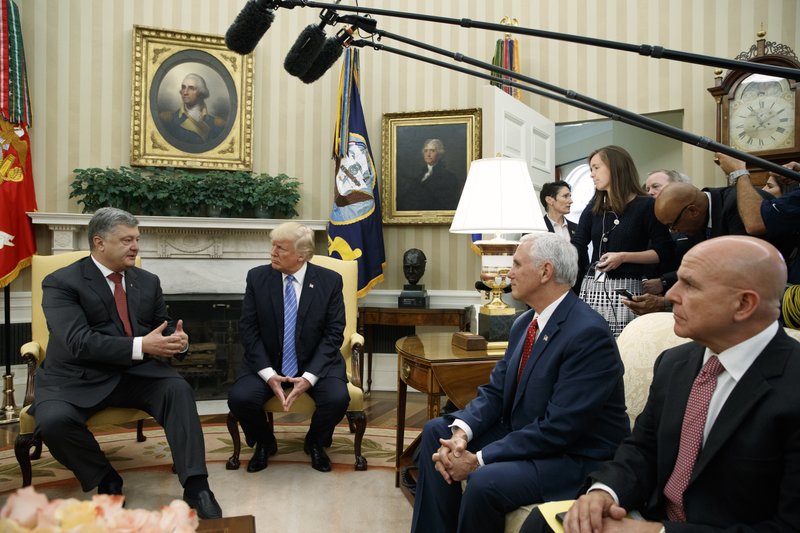WASHINGTON -- President Donald Trump met with his Ukrainian counterpart Tuesday amid intensifying questions over whether Trump's administration will step in to protect partners in the face of Russian aggression.
The meeting with Ukrainian President Petro Poroshenko was originally described by the White House as a brief "drop-in." But the two presidents posed for photographs in the Oval Office and made brief remarks after Poroshenko's more extensive meetings with Vice President Mike Pence and the administration's top national security advisers.
With the Ukrainian leader sitting by his side, Trump said it was a "great honor" to meet Poroshenko and that "a lot of progress has been made" in the U.S. relationship with Ukraine.
Ukraine is a "place that we've all been very much involved in," Trump said at the meeting with Poroshenko. "We've had some very, very good discussions. It's going to continue throughout the day, and I think a lot of progress has been made."
[PRESIDENT TRUMP: Timeline, appointments, executive orders + guide to actions in first 100 days]
There was no mention of Russia, nor did Trump respond to questions about the ongoing investigation over possible collusion by members of the Trump administration with Russia during the 2016 presidential election. Trump staunchly denies that he had any contact with Russian officials during the campaign and has tweeted that the investigation is a "witch hunt" spearheaded by Democrats bitter over losing the election.
Trump has maintained that he hopes to establish better ties with Moscow, repairing ill will from the Barack Obama era that resulted from Russia's 2014 annexation of Ukraine's Crimea region and Russia's widely condemned support of Syrian President Bashar Assad. In April, after a suspected chemical attack against civilians in northern Syria by government forces, Trump said U.S. relations with Russia "may be at an all-time low."
But less than a month later, the president hosted top Russian diplomats in a closed Oval Office meeting that suggested relations weren't so bad after all. Photos later emerged showing Trump laughing with Russian Foreign Minister Sergey Lavrov and Russia's envoy to the U.S., Sergey Kislyak. The White House press corps was not allowed access to that meeting.
Trump has also raised concerns among NATO allies about whether he would turn his back on the military alliance, which partly promises U.S. support for European allies against Russian aggression. Trump has worked to assure European leaders that he will continue to support the alliance but insists that member countries meet their financial obligations to "pay their fair share."
Poroshenko said Tuesday that he hopes the two countries can engage in "effective collaboration."
In his meeting later with Defense Secretary James Mattis, Poroshenko said, "I think that we can expand our cooperation because we fight not only for our territorial integrity and our independence, not only for our sovereignty, we are fighting for freedom, we are fighting for democracy."
Sanctions on Russians
The White House meeting began shortly after the Trump administration announced that it has imposed sanctions on two Russian officials and three dozen other individuals and companies over Russian activities in Ukraine.
Treasury Secretary Steve Mnuchin said the new penalties are designed to "maintain pressure on Russia to work toward a diplomatic solution."
Sanctions over the fighting in eastern Ukraine "will remain in place until Russia fully honors its obligations under the Minsk agreements," while measures "related to Crimea will not be lifted until Russia ends its occupation of the peninsula."
In all, Tuesday's action targets 38 individuals and firms. Any assets they have in the U.S. are now blocked, and Americans are prohibited from doing business with them. The Russian officials affected are Moscow's envoy for overseas Russians and its chairman for humanitarian assistance in separatist-held eastern Ukraine.
Lavrov, speaking in Moscow on Tuesday after talks with his French counterpart Jean-Yves Le Drian, said the new restrictions "don't help to improve the climate." He added that he could "only voice regret about the Russo-phobic obsession of our American colleagues ... that has gone beyond any limits."
Ukraine relied heavily on the support of Trump's predecessor, Obama, as Russia annexed Crimea in 2014 and stoked the three-year conflict on the two nations' border that has killed more than 10,000 people and displaced 2 million.
The U.S. was instrumental in imposing the Western sanctions on Russia and provided billions of dollars in aid along with some nonlethal military equipment. The European Union on Monday extended for another year its Russia sanctions over the annexation of Crimea.
By expanding sanctions, the U.S. is "deliberately pouring water on the mill of the party of war in Kiev -- those who don't want a settlement and are interested in the breakdown of the Minsk agreements," Russian Deputy Foreign Minister Sergei Ryabkov said, according to the RIA Novosti news service. Russia will take retaliatory steps, while the U.S. action is another "missed opportunity to move toward improving our bilateral relations," he said.
Tensions between the U.S. and Russia are high even as the White House considers scheduling a meeting with Russian President Vladimir Putin on the sidelines of next month's Group of 20 meeting.
White House statements on Poroshenko's meetings with Trump and Pence made no mention of Russia. However, White House spokesman Sean Spicer said Tuesday that the topic of Russia "obviously came up to discussion with the president today."
Spicer said the administration will continue to "advocate" for sanctions as long as Russia continues its aggression in eastern Ukraine.
Information for this article was contributed by Vivian Salama, Robert Burns and Lolita Baldor of The Associated Press; and by Stepan Kravchenko, Jake Rudnitsky, Jennifer Epstein and Ksenia Galouchko of Bloomberg News.
A Section on 06/21/2017

